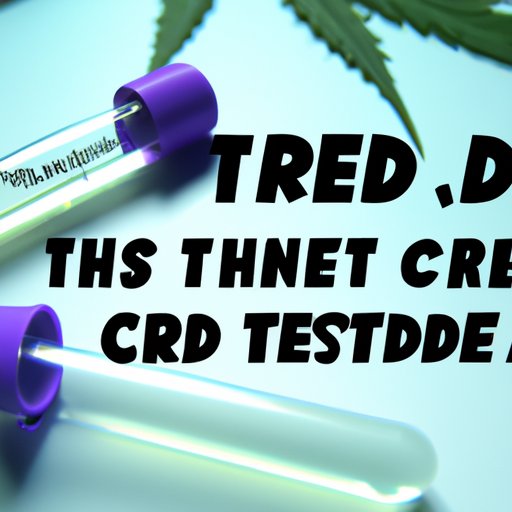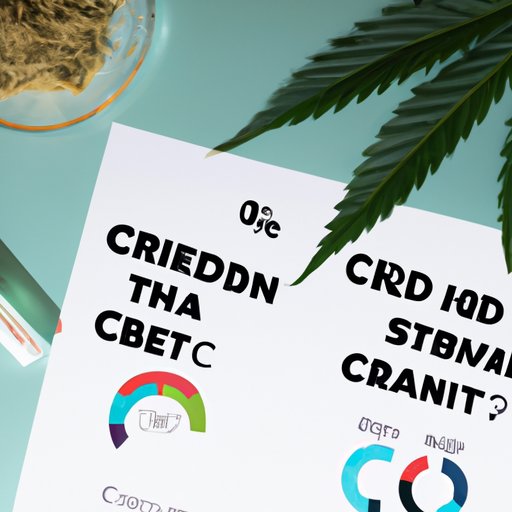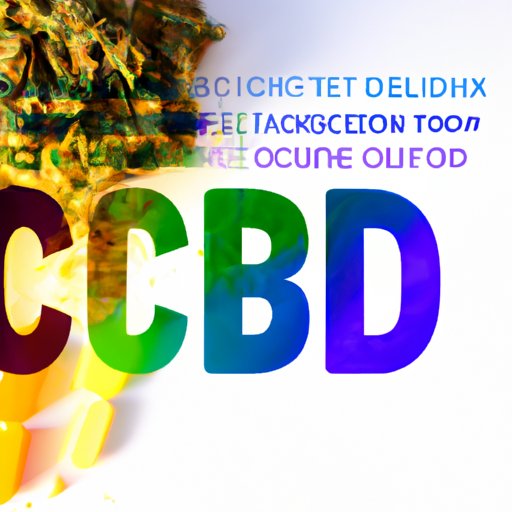Introduction
Cannabidiol, or CBD, is a naturally occurring compound found in cannabis plants. Unlike the more well-known cannabinoid tetrahydrocannabinol (THC), it does not produce intoxicating effects. CBD is commonly used to alleviate symptoms of anxiety, depression, and pain. Despite its reputed health benefits, many people are hesitant to try CBD products in fear of failing a drug test. This article aims to provide a comprehensive guide to educate and inform readers about the relationship between CBD and drug tests.

The Truth About CBD and Drug Tests: Separating Fact from Fiction
When it comes to drug tests, CBD is often confused with THC. However, these two compounds differ significantly with regards to how they affect drug test results.
THC is the psychoactive compound in cannabis plants that causes the “high” associated with marijuana. Drug tests target THC, which is why usage of THC may result in a positive drug test. On the other hand, CBD is not an intoxicant and is not the target of most drug tests. If a drug test is specifically designed to detect CBD, it will be clear in the instructions provided.
It’s also essential to note that not all drug tests are the same and will result in the same outcomes. Most drug tests are testing for THC, the active compound in marijuana that induces mind-altering effects. However, it is essential to remember that drug tests typically have a threshold for THC, and the legally accepted threshold is incredibly low. This brings into question how some CBD products can contain THC without causing users to fail drug tests.
Can CBD Products Cause You to Fail a Drug Test? Here’s What You Need to Know
CBD products come in many forms, including full-spectrum, broad-spectrum, and isolates. It’s essential to note that full-spectrum CBD and broad-spectrum CBD products may contain traces of THC, while CBD isolate does not.
Full-spectrum CBD contains a range of different compounds, including THC, which is why it’s important to check the label of the product. While the THC levels are usually less than 0.3%, it could still show up on a drug test if you consume high doses frequently. Broad-spectrum CBD is a better alternative for those who want to avoid THC but still benefit from other cannabinoids present in full-spectrum CBD products.
It’s also essential to consider the timing of drug tests. THC is stored in fat cells, which means it can remain in the body for weeks after ingestion. As a result, consistent and frequent usage of CBD oil with trace amounts of THC can increase the risk of failing a drug test.
Everything You Need to Know About CBD and Drug Tests
Drug tests vary in their accuracy, leading to false positives or negatives and inaccurate results overall. Many factors can impact drug test results, including dosage, frequency of use, body weight, metabolism, and more.
Understanding the different types of drug tests is essential, and most employers use urine drug tests. Although, hair, saliva, and blood tests are also available.
CBD use can impact drug test results, but variables such as the source of the CBD product, dosage, and frequency of use will also come into play. Having a conversation with a medical professional or employer can alleviate concerns about using CBD products.
How to Avoid Failing a Drug Test When Using CBD Products
The best way to reduce the risk of failing a drug test while using CBD products is to choose products with no THC. Products made with CBD isolate or broad-spectrum CBD have zero THC content, so they’re safe to take. Before purchasing any CBD products, it’s essential to do research on the manufacturer and ensure that third-party testing has been done to certify that they are free of THC.
Additionally, it’s important to take correct dosage and frequency into consideration. When using full-spectrum CBD products with trace amounts of THC, taking small doses and limiting usage is key to avoid having positive drug test results.

Debunking Common Misconceptions About CBD and Drug Testing
Like any emerging substance, there are common misconceptions about CBD use that may confuse users and impact decisions. Here are a few misconceptions:
1. CBD is always free of THC: Many CBD products contain trace amounts of THC, so it’s important to check the label to understand the THC content.
2. CBD is always legal: While the 2018 Farm Bill makes CBD legal in most states, it’s important to double-check state laws and always purchase from reputable brands.
3. CBD is always safe: CBD has many reported health benefits, but it’s still essential to exercise caution and purchase from legitimate manufacturers to avoid any unknown adverse side effects.

Understanding the Science Behind CBD and Drug Test Results
Most drug tests are designed to detect THC, and different types of drug tests can deliver different results. The most common type of test is a urine test, but blood, hair, and saliva tests can also deliver results. THC can remain in the body for weeks, depending on the individual’s metabolism, body fat, usage patterns, and other variables. When it comes to CBD, using products with zero THC content is the best way to avoid any risk of failing drug tests.
Navigating the Gray Area of CBD and Drug Testing: A Comprehensive Guide
When it comes to CBD and drug tests, caution and communication are key. Understanding drug test protocols and the CBD products in question can help avoid any misinterpretation of results. It’s crucial to work with a reputable manufacturer and medical professional to ensure that all potential risks and adverse reactions are addressed.
Conclusion
While there are legitimate concerns about CBD and drug testing, research is starting to prove that the relationship between the two is not as clear-cut as once thought. THC is the compound most drug tests detect, and it’s essential to choose CBD products that are THC-free, third-party tested, and of high quality. While employers and employees alike may feel cautious about CBD use, understanding the science behind drug tests and CBD interactions can mitigate any risks.
If you’re considering using a CBD product, be sure to exercise caution and do your research. Consult with a medical professional if you have concerns or questions regarding CBD and drug tests.
